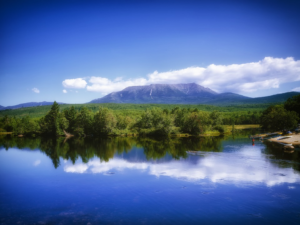“What a place to live, what a place to die and be buried in! There certainly men would live forever, and laugh at death and the grave.” -Thoreau reflecting on the image of the untapped Maine wilderness from the ridge of Katahdin
At the end of August, 1846, Henry David Thoreau set out from Concord towards Bangor with a relative engaged in the lumber business. His goal was to ascend Ktaadn (he preferred the indigenous spelling) and explore the lakes surrounding the area. He travelled by batteau, a hybrid vessel like a shallow canoe used by fur traders. Together with some woodsmen he met along the way, Thoreau paddled and portaged his way to what he called the Sowadnehunk Deadwater, around twelve miles from the summit. From there he made two attempts at reaching the peak. Beyond any success he had in these ascents, however, Thoreau found something more intangible and valuable along his trek. He faced a wilderness beyond anything he knew, with a character so sublime as to evoke feelings of awe. By exploring his thoughts and descriptions, we glimpse a view of the Maine wilderness that fully appreciates its value. The wonder of the outdoors can be found in our own backyard in Maine, and Thoreau helps us to see that through his exultations upon the ridge of Katahdin.
The first hint of his awe for the Maine wilderness began with a night along a lake. Restless from the sounds of his companions stoking the fire, he walked along the moonlit shore. Absorbed by the sounds of a small stream near him, he observed that the “the glassy smoothness of the sleeping lake, laving the shores of a new world, with the dark, fantastic rocks rising here and there from its surface, made a scene not easily described. It has left such an impression of stern, yet gentle, wildness on my memory as will not soon be effaced.” This evokes a feeling of beauty rarely observed. The sense of the lake forming a “new world,” combined with the ominous dark rocks gives the impression of the lake belonging to a place typically unreachable or from beyond this world.
And a sense of a supernatural quality pervading the Maine wilderness continued in Thoreau’s thoughts as he climbed to the ridge of Katahdin on a cloudy day. Alone and with little to see except a few crags rising out of the mist, Thoreau turned to thoughts of Prometheus and the rock to which the man who stole fire from the gods was bound. As he writes of the experience: “I looked with awe at the ground I trod on, to see what the Powers had made there, the form and fashion and material of their work. This was that Earth of which we have heard, made out of Chaos and Old Night.” Out of this reverence and mythological view comes a sense that the natural world around him was not necessarily made for him. He continues by saying that his surroundings were “not lawn, nor pasture, nor mead, nor woodland, nor lea,” and that it was “was made forever and ever,—to be the dwelling of man, we say,—so Nature made it, and man may use it if he can.” This illustrates the distinction between our perspective, that nature was made for us, and an endless view of the natural world as something beyond our control. Thoreau glimpsed a wilderness while in Maine that was devoid of any need of human interaction. We may use it if we can manage it, but it leads an existence separate from any human involvement. It was that “stern, yet gentle,wildness” which showed Thoreau that the woods and mountains around him were worthy of respect. The trees, lakes, and rocks stood immovable before him, showing him how they could exist without him, and any attempt to interact would demand reverence.
In the end, Thoreau did not reach the summit. But on a cloudless spot lower on the mountain, he sat with his companions and looked out over the Maine wilderness. As he gazed, he commented “What is most striking in the Maine wilderness is the continuousness of the forest, with fewer open intervals or glades than you had imagined…It is even more grim and wild than you had anticipated, a damp and intricate wilderness, in the spring everywhere wet and miry.” Perhaps things have changed since the mid-nineteenth century, but his convictions remain true. The wilderness we have in Maine is beautiful and worthy of respect. It is a place of wildness beyond what might be anticipated. It is vast and can leave one awestruck as to the scenery that can be found in our own backyard. The view from the ridge left Thoreau exclaiming the words that began this essay. Indeed, what a place to live, so close to nature in all its beauty and wonder. The Maine wilderness is a special place, and as Thoreau proclaimed we are lucky to call it home.
